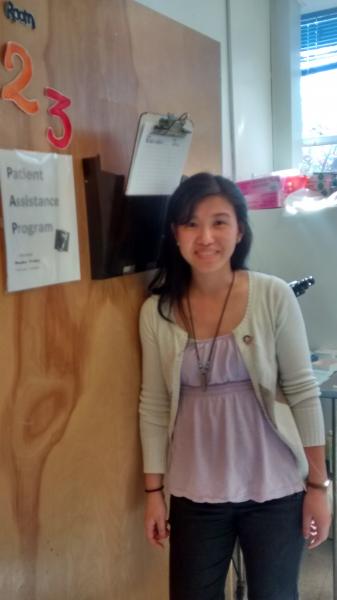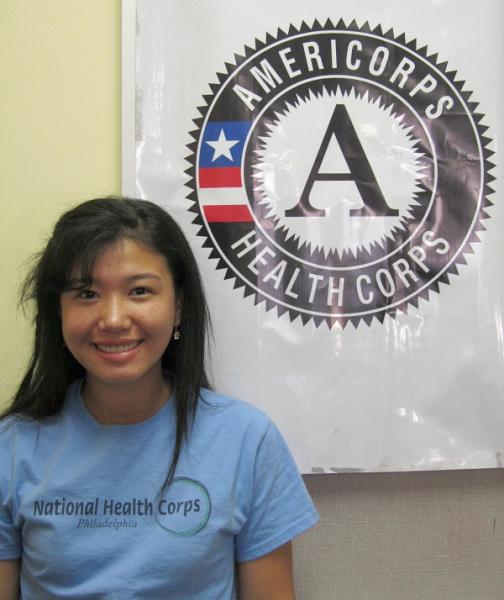Perhaps the most common question I’ve been asked throughout my service term has been: “What do you do?” Whether it is a staff member, a patient, someone in the community, or even my mom, there is a lack of familiarity with what I do exactly as an AmeriCorps/National Health Corps member. During Pre-Service Orientation, we learned about AmeriCorps identity and practiced making one-minute elevator speeches in anticipation of this very question. Yet, every time the question is posed, I am stumped. My answer varies from
“I help uninsured patients get free medications.”
“I serve at a city health center and am part of program that provides health education and access services for underserved populations. We also participate in monthly group service projects and have ongoing trainings and such.”
“It’s kind of like Peace Corps, but domestic.”
“I am part of a national service program and serve as a Patient Advocate. I help uninsured or underinsured patients enroll in prescription medication programs free of cost in order to increase their access to care.”
The very question of what I do implies not only a lack of awareness of national service programs, but also suggests that there is more outreach to be done. I believe that we as AmeriCorps members play an important role in closing this knowledge gap. I have learned that the best way to help national service programs reach more people is more than simply talking about what we do; it involves taking an active and positive role in our daily service. We are national service ambassadors. As the sole AmeriCorps member serving with the Philadelphia Department of Public Health at Health Center #3, everything I do and say is a reflection of the program. By exhibiting empathy and professionalism, I am able to encourage others to trust and value not only my current role, but this same position for future AmeriCorps members as well.

A few times, I was able to show a glimpse of what I do when I had nursing students shadow me for a few hours. One student observed me meet with a young woman who had been paying hundreds of dollars out of pocket for one of her medications. She had known about the program doing through doing her own research, but never had the resources to apply. I told her all she needed was to provide me with her tax return document and the rest of the work - filling out the application, attaining her doctor’s approval, submission, follow up with the program, and placing subsequent refills - would be my job. She was both relieved and excited and promised to return the next day with her forms. The nursing student then followed me upstairs where I faxed applications completed from the previous day. “Yes, faxes are still a means of communication,” I explained. She then followed me back to my office where a clerk brought me medication shipments to be processed. I always leave my door open, so patients can visit my office at anytime. While I was making medication labels, a patient came in with a prescription for an antidepressant, but there were not any Patient Assistance Programs available. However, I found that a month’s worth of the medication was about $25 at an outside pharmacy and printed her a coupon. We also talked about her insurance status and because I thought she may qualify for Medicaid, I also referred her to see our Benefits Counselor. I then explained to the student the nuances of different Prescription Assistance Programs in terms of which drugs are covered, which patients qualify, and which documentation was needed. I shared stories about times when applications were denied due to subtle changes in the programs. She then had to leave, but remarked that she was grateful to have seen the amount of work involved in resolving one seemingly simple problem - helping vulnerable patients access much needed medications to maintain their health.
Sometimes, it’s easy to get lost in the routines of day to day service and forget the bigger picture - that we are National Health Corps AmeriCorps Members who are making a difference in our communities. We are valuable assets to the team and bring to the table a unique skill set. At a recent group service project, the volunteer coordinator was highly impressed with our ability to finish up tasks efficiently and effectively. Automatically, I replied, “That’s because we’re AmeriCorps Members and we get things done!” Keeping the motto of AmeriCorps in mind, we each can spark an interest in others through what we do every day. An interest or curiosity leads to a conversation and a conversation ignites action. Perhaps one day the question is not going to be “What do you do?” so much as “How do you serve?”

This post was written by PHC member Di Chung.
Di serves at the Philadelphia Department of Public Health - Health Center #3 as a Patient Assistance Program Advocate.
